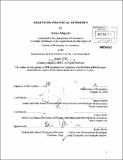Essays on political economy
Author(s)
Migueis, Marco (Marco A.)
DownloadFull printable version (4.608Mb)
Other Contributors
Massachusetts Institute of Technology. Dept. of Economics.
Advisor
James Snyder and Esther Duflo.
Terms of use
Metadata
Show full item recordAbstract
Essay 1: The Effect of Political Alignment on Transfers to Portuguese Municipalities. In this paper, I use financial data of Portuguese municipalities (1992-2005) to investigate if political alignment between the central government and a local government brings financial benefit to local governments. I use a regression discontinuity design, in order to distinguish between generally partisan transfers (larger transfers to municipalities where the party in power has larger vote share), and the effect of political alignment per se, between the national government and the municipal chamber president. The benefit of pure alignment is substantial. Estimates imply that municipalities aligned with the central government receive 19% more targetable transfers than do municipalities where the party in power nearly won the local elections. I test an electoral motivation for this bias in transfers: extra transfers prove to increase the vote share of PSD incumbents, but not the vote share of PS incumbents; however, municipal incumbency does not lead to better results in national elections. Essay 2: Local Government Fiscal Policies: Left-wing vs. Right-wing Portuguese Municipalities. In this paper, I use financial data from Portuguese municipalities (from 2003 to 2007) to investigate if the ideology of the local government incumbent influences local fiscal policies. Regression discontinuity design is employed to ensure proper identification of the ideology effect on fiscal policies. Left-wing control of municipal presidency showed a significant effect on the likelihood of adopting a municipal corporate tax. Left-wing municipalities also proved more likely to invest in social infrastructure. On the other hand, right-wing municipalities were shown to be more likely to grant subsidies to families, as well as to offer more generous compensation to their municipal workers. Finally, left-wing municipalities were less likely to resort to high levels of debt than their right-wing counterparts. Essay 3: Political Alignment and Federal Transfers to the US States. In this paper, I use financial data regarding transfers from the US federal government to US States (1982-2001) to investigate if political alignment, defined as a state governor and the US President belonging to the same political party, influences the level of federal transfers received by a state. Regression discontinuity design is used to ensure proper identification of the alignment effect. Total federal transfers to aligned states are significantly larger, with the most trustworthy estimates in the neighborhood of 3%. Most of this advantage comes from significantly larger defense transfers to aligned states (the most credible estimates indicate a 13% advantage). Finally, other types of federal transfers are not significantly affected by political alignment, namely entitlements, salaries and, perhaps surprisingly, project grants.
Description
Thesis (Ph. D.)--Massachusetts Institute of Technology, Dept. of Economics, 2010. Cataloged from PDF version of thesis. Includes bibliographical references.
Date issued
2010Department
Massachusetts Institute of Technology. Department of EconomicsPublisher
Massachusetts Institute of Technology
Keywords
Economics.